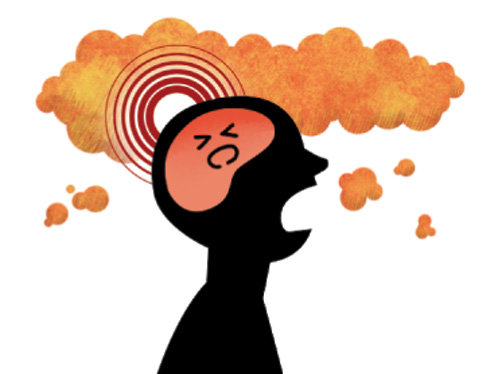The impact of air quality on cognitive ability
The impact of air quality on cognitive ability
Posted April. 25, 2020 07:49,
Updated April. 25, 2020 07:49

Humans’ brain and their cognitive abilities have expanded explosively after Homo erectus, the world’s first humans working upright, started making tools with their free hands. Sci-fi movies often depict human beings of the future who depend on science and technology based on their large brains and strong cognitive abilities. However, some pundits have claimed recently that humans will see their cognitive abilities deteriorate due to air pollution.
A joint research team from the University of Colorado Boulder, the Colorado School of Public Health and the University of Pennsylvania has published shocking outcomes of their study, suggesting that higher CO2 levels can decrease humans’ cognitive abilities by 50 percent. The study involved two scenarios, wherein CO2 emissions will be cut globally and wherein the emission levels will remain the same, and analyzed people’s cognitive abilities in 2100. The results show that students’ cognitive abilities will decline only 25 percent under the scenario wherein the entire world joins forces to cut CO2 emissions. In contrast, their cognitive abilities is projected to decline by 50 percent under the second scenario. The study predicts that higher CO2 emissions could reduce cognitive abilities of the entire humanity, rather than people just in certain regions or communities.
Of course, a decline in humans’ cognitive abilities due to polluted air closely affects us who are living in the contemporary world as well. A research team from the University of Sydney conducted a study on the relationship between air pollutants and mental handicap among 18,000 children who were born in the U.K. between 2000 and 2003. The study showed that residential areas where children with mental disabilities live often had contaminated air quality than areas where children without any mental disabilities reside.
In particular, another study suggests that poor air quality can lower people’s cognitive abilities even within a very short time. A team of researchers at London School of Economics conducted a study on relationship between air pollution and academic performance among 2,400 students, which clearly showed the impact of air pollution on students’ cognitive abilities. The research team divided students who are taking a test into two groups, and let the first group take the test in a classroom with air quality below the permissible level (50μg per sq. meters) set by the World Health Organization, and the other group to take the same test in a classroom with air quality exceeding the permissible level. The results showed that the second group recorded test scores that are 3.4 percent lower than the first group.
Then, what should be done to prevent humans’ cognitive abilities from declining? Experts say that the most pressing short-term task is to solve the problem with indoor air quality, because people in contemporary world spend most of their time indoors.
Dr. Richard Shaughnessy, a senior scientist at The University of Tulsa Indoor Air Program, picked ventilation as the best solution to the problem. He said a constant decline in students’ cognitive abilities due to indoor air pollution can have negative impact on their academic performance, and this can be addressed relatively easily through sufficient ventilation.
In the long term, we should take measures to fundamentally reduce CO2 levels, including reduction of fossil fuel consumption and carbon emissions neutral projects. They can generate effect only if they are implemented as global initiatives rather than national projects just by certain countries. More than anything, all of us should join hands to manage and improve air quality in order to protect the health and intellectual capability of our own family members, and ensure the safety of Planet Earth.
Headline News
- N. Korea launches cyberattacks on S. Korea's defense companies
- Major university hospital professors consider a day off each week
- Italy suffers from fiscal deficits from ‘Super Bonus’ scheme
- Inter Milan secures 20th Serie A title, surpassing AC Milan
- Ruling and opposition prioritize spending amid tax revenue shortfalls







